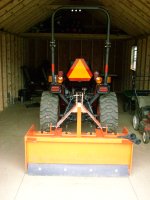Wheatland KB
Silver Member
- Joined
- Feb 12, 2007
- Messages
- 140
- Tractor
- Kubota L3400HST
How big is the floor and how will it be supported? Once you have the joists sized (think span tables) will it be worth decking it with 1" x 6" t&g and covering that with 1/2" ply or osb.
Check your building code for calculations and include the tractor weight as point loads (under tires) and dead load (floor area).
I have a wooden floor that is 2x8 joists 12" oc with a span of 10' decked with 2x6 and I drive/park my L3400 with FEL and tiller attached (I can't recall the weight but it must be around 3000) with no issues whatsoever.
KB
Check your building code for calculations and include the tractor weight as point loads (under tires) and dead load (floor area).
I have a wooden floor that is 2x8 joists 12" oc with a span of 10' decked with 2x6 and I drive/park my L3400 with FEL and tiller attached (I can't recall the weight but it must be around 3000) with no issues whatsoever.
KB

